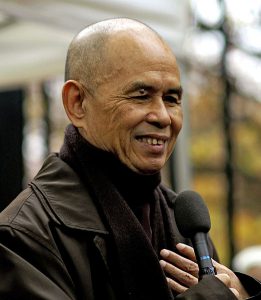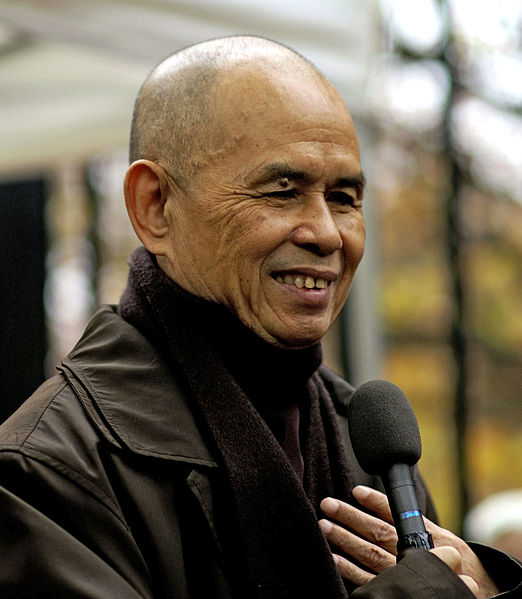
Mindfulness teacher, Thich Nhat Hanh
Blessed are the meek, for they will inherit the earth (Matthew 5:3).
Thich Nhat Hanh and The Miracle of Mindfulness
The meek practice humble gratitude even in the face of indifference or hostility. They find their anchor in their connection with God and creation, not in the games through which society assigns prestige.
Thich Nhat Hanh, a Vietnamese Buddhist monk, made a life of teaching and living meekness. A leader in nonviolent resistance to totalitarian forces in the 1960’s, Martin Luther King, Jr., nominated him for the Nobel Peace Prize. He continued to lead in exile through his letters offering spiritual nourishment to resistance workers at home. Those letters were translated into English as The Miracle of Mindfulness. Ironically, that book sparked the mindfulness movement in the west, bringing healing and spiritual depth to nations that escalated the violence in his homeland.
What is Mindfulness?
Mindfulness is nonjudgmental awareness of present moment experience:
- awareness because it requires wakeful attention,
- nonjudgmental because it accepts whatever pleasant or unpleasant experiences arise in experience without fighting or clinging to them, and
- in the present moment because wherever the mind drifts, it returns gently to now.
Mindfulness Supports Christian Prayer and Personal Serenity
In Zen and the Birds of Appetite, Thich Nhat Hanh’s friend, Thomas Merton, explored common ground shared by Christian mysticism and Buddhist meditation. Jean-Pierre de Caussade’s Christian classic, Sacrament of the Present Moment, depicts the disciple as one who listens afresh each moment for God’s leading. Jesus promised the reign of God not only as a future hope but as a present reality. If we believe in the risen Christ’s incarnate presence, we can only open our hearts to the divine in the concrete experience of now, however mundane it may seem.
Take a few minutes. Attend to your breath, or if you prefer, listen to ambient sounds or the weight of your body in the chair. If walking, attend to the feel of the ground on the soles of your feet. Welcome to now. Don’t analyze; just receive. As thoughts or emotions or itches come, welcome them and gently bid them adieu like driftwood passing on a river. Return to your breath or whatever sensation anchors you, a thousand times if necessary. You can’t go wrong unless you stop returning.
Then your feelings of pain or anguish control your reactions less, and you awaken to reality as it is. Inherit the earth. God meets you there. You do not have to name God or think theological thoughts. Just open your heart to the God “above all and through all and in all” (Ephesians 4:6).
Thich Nhat Hanh’s Example Today
Four years ago, Thich Nhat Hanh, suffered a stroke. According to his senior disciple, Sister Chan Khong, the attending physician did not give him more than a day to live. Now 92, he lives. He cannot stand or walk on his own, but an attendant helps him with a singing chant that he joints: “Here, now.” His disciples attribute his miraculous recovery to prayers of others from Buddhist and other faiths.
Please pray for him. You may pour a cup of tea and smell the aroma, feel the warmth on your tongue, taste the gentle herbs, and let it wash to your belly and fill you. At peace with yourself, fully present to what is, note your solidarity with all beings. That is how he prays. That is how he has prayed for you all his life.
Related Posts
Breathing Your Way To God
Acceptance Amid the Unacceptable: A Meditation on Serenity and Justice
Advent Lesson From the Cereus Flower
Authentic Prayer
Dr. King On Overcoming Fear With Love


This post is perfect! I just started rereading Thich Nhat Hanh’s Living Buddha, Living Christ. Truly wonderful read.
That is a wonderful read! I read it a few years ago at the recommendation of your friend and my wife, Wanda Cantrell.
Thanks, Marshall for the great summary of Hahn. I have read many of us books and feel he is a spiritual mentor.
He is very generous with the wisdom of his tradition without pressing us to be untrue to our own.